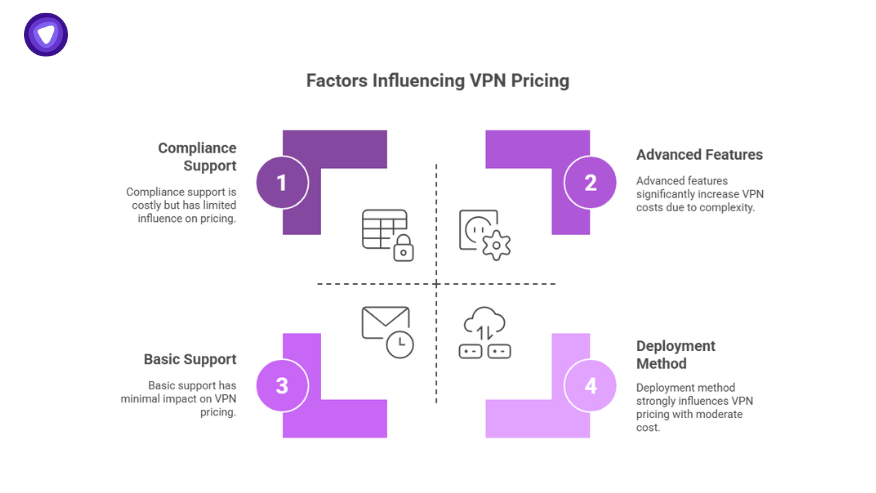If you’re asking how much does a VPN cost for a company in 2025, here’s your snapshot: expect to pay anywhere from $5 to $15 per user per month for smaller teams. For larger businesses, managed enterprise VPNs often start around $10,000 per year, sometimes more if you need extras like advanced compliance or global server networks. The VPN average cost depends on your setup: DIY, managed, or white label.
Quick Calculator
Estimate Your Company VPN Cost
How Much Does a VPN Cost For a Company? (Quick Breakdown)
Let’s answer the big one first:
Small teams (under 10 users)
- $5–$12 per user/month
- Around $600–$1,200 per year
Mid-size businesses (25–100 users)
- $300–$2,000 per month
- $5,000–$20,000+ per year
Enterprises (200+ users, compliance needs)
- Starts at $10,000/year and can scale past $100K depending on features
That’s the short version. But you need to understand what drives those costs before you decide what’s right for you.
Why Companies Use VPNs in the First Place?
Before we talk numbers, let’s answer the obvious: why do companies pay for VPNs at all?
- Secure remote access to internal systems
- Data encryption across public networks
- IP masking for location-specific tools or services
- Compliance with regulations like GDPR, HIPAA, and SOC 2
- Privacy protection for customers and employees alike
Whether you’re a 5-person agency or a global tech company, the value is clear. What’s not so clear is how the pricing works—or why it varies so much.
What Affects VPN Pricing?

There isn’t a flat rate across providers. Here’s what actually influences how much you’ll pay:
1. Number of users
Most services charge per user. You might see tiers like 10 users, 50 users, or 100+. Some offer bulk licensing. Others don’t.
2. Features included
Need a kill switch? Dedicated IP? Split tunneling? The more advanced the features, the more you’ll pay. It’s also where things like VPN pricing comparison matter—because not every vendor offers the same value at the same tier.
3. Compliance support
If your business deals with sensitive data, expect to pay more for providers who support audits, maintain strict no-logs policies, and follow industry frameworks.
4. Support level
Basic email support is cheap. 24/7 live chat with a dedicated account manager? Not so much. Support costs often don’t show up in pricing tables—but they add up fast, especially for larger teams.
5. Deployment method
Are you using a cloud-based VPN, hosting your own, or going with a white-label solution? The deployment model affects how much it costs for a VPN—sometimes more than the user count does.
How Much Does a VPN Cost Per Month?
For businesses, monthly pricing is still common. Here’s a snapshot of typical costs:
| Plan Type | User Count | VPN Cost Per Month |
| Basic business plan | 5–10 users | $50–$120 |
| SMB tier | 20–50 users | $200–$700 |
| Enterprise-level | 100–500 users | $1,000–$5,000+ |
Keep in mind—how much a VPN costs per month can look cheap upfront, but not all plans include setup, support, or scaling. That’s why some teams prefer to calculate VPN cost per year for more accurate budgeting.
How Much Is a VPN Subscription for Your Business?
Unlike consumer VPNs, business VPN subscriptions include:
- Multi-device support per user
- Admin control panels
- Device and network management
- Central billing
- Compliance-grade security features
So if you’re wondering how much is a VPN subscription for your team, you’re not just paying for access. You’re paying for peace of mind—and administrative control.
Expect business subscriptions to start at $50/month for small teams and rise with headcount and feature sets.
Can You Build Your Own VPN? Here’s What That Costs
Some companies want total control. That means building and hosting their own VPN. But it’s not cheap—and it’s definitely not fast.
Here’s a rough breakdown of how much does it cost to set up a VPN for a company if you build it yourself:
| Cost Type | Estimate |
| Server infrastructure | $300–$1,000/month per region |
| Developer time | $20,000+ for setup + ongoing maintenance |
| Apps & UI | $10,000–$30,000 |
| Security audits | $5,000–$25,000 |
| Compliance/legal | $3,000–$10,000 annually |
| Support team | Variable, often $50K+ per year for 24/7 |
If you’re wondering how much money would I have to spend to make a VPN, the answer is often $50K+ upfront, with high ongoing costs. For most companies, it’s not worth the tradeoff—unless you’re a VPN provider yourself.
How Much Does It Actually Cost for VPN Providers to Run a Service?
On the backend, VPN providers deal with:
- Server maintenance
- Bandwidth costs
- Monitoring tools
- Legal and compliance audits
- Software updates
- Support teams
- User account and billing systems
This is why VPNs that seem cheap (or free) either cut corners—or aren’t making money.
If you’re considering offering VPN services, you’ll want to study how much does it cost for a VPN provider to offer a VPN service, not just how much you can charge. That’s where white-label VPNs like PureVPN come in—but more on that later.
Does a Small Business Really Need a VPN?
Short answer: yes.
It doesn’t matter if you’re running a five-person creative agency or a growing SaaS startup. If your team works remotely, handles client files, or logs into sensitive systems—a VPN is not optional. It’s the easiest way to secure traffic across untrusted networks.
Some owners skip it to save money. But that’s a short-term move that can lead to long-term problems. A breach, lost client trust, or leaked data will cost far more than $10/user/month ever would.
Even if you’re just starting out, knowing how much a VPN costs for a company per user helps you plan properly—and shows investors or partners that you’re taking security seriously.
VPN Pricing Models: Which One Works for You?
Find Your Best-Fit VPN Model
Let’s compare the major types of VPN options businesses choose in 2025:
1. Cloud-hosted VPNs (Per user pricing)
- Simple to set up
- How much is a VPN per month here? Usually $7–$15/user
- Good for quick deployment, but may get pricey as your team grows
2. Self-hosted VPNs
- Based on OpenVPN, WireGuard, or similar
- You own the servers
- High control, high responsibility
- You handle updates, legal, and uptime
- Costs are variable and harder to forecast
Learn more about self-hosting VPNs: Click here
3. White-label VPN solutions
- You sell your own VPN under your own brand
- Backend, infrastructure, and support are handled
- You control pricing and customers
- Ideal if you want a VPN business without managing servers
- VPN pricing comparison here shows better profit potential with less upfront work
Each model has its use case. The key is picking what aligns with your resources and goals.
Hidden VPN Costs Most Businesses Miss
If you’re only looking at the sticker price, you’re not seeing the full picture. There are always extra costs—whether you build, buy, or resell.
Here’s what often catches teams off guard:
- Support demand grows with user count
- Admin onboarding takes time and training
- International server costs can vary
- Compliance costs aren’t just legal—they include data handling, logs, encryption audits
- Overage fees for bandwidth or device limits
The real answer to how much does a VPN cost for a company depends on the full lifecycle—not just the first invoice.
How Much Is VPN for iPhone and Mobile Teams?
If your staff travels or works on mobile, pricing gets trickier. Why?
- Some providers charge per device, not per user
- iOS/Android apps need mobile-specific features: auto-connect, kill switch, deep system integration
- Not all “desktop VPNs” work well on phones
So if you’re asking how much is VPN for iPhone in a business context, make sure your provider offers full-feature parity across platforms—without charging extra for it.
PureVPN, for instance, includes mobile apps as standard. No surprises.
How to Keep Your VPN Budget Under Control?
VPN costs scale with your business. But smart planning keeps things manageable.
Here’s how to avoid surprises:
- Choose annual billing—you’ll usually save 10–30%
- Only pay for users who need VPN access daily
- Review feature usage—cut extras you’re not using
- Ask about reseller or white-label models if you plan to offer VPN access to clients or partners
- Look for providers that offer admin dashboards and billing visibility, so you’re never in the dark
Small businesses that track this stuff from day one avoid billing headaches later.
How Do You Get a VPN for Your Business?
You’ve got three main paths:
- Buy from a VPN provider with a business plan. Easy, fast, scalable.
- Build your own. Expensive, complex, long-term investment.
- Join a white-label program. You get a ready-made product under your own brand, with full control and zero infrastructure.
If you’re a security agency, MSP, SaaS company, or even a media brand—white-labeling gives you a new revenue stream without reinventing the wheel.
This is especially true if you’ve wondered how much does it cost to create a VPN service. The answer: a lot, unless you work with someone who’s already done it.
Final Word – Know the Cost Before You Commit
Here’s the bottom line: there’s no one-size-fits-all answer to how much does a VPN cost for a company.
It depends on your team size, your tech stack, your budget, and your business model.
But here’s what we do know:
- Starting with a basic plan might work for a while
- As your needs grow, costs can scale quickly
- The more control you want, the more it’ll cost—unless you go white-label
Knowing what you need before signing anything makes all the difference.
Want a Faster, Smarter Way to Offer VPN to Clients or Staff?
You don’t need to build a VPN from scratch to have your own product.
With PureVPN’s White Label Solution, you get:
- Global VPN network access
- Ready-to-go apps for desktop and mobile
- Admin tools, billing support, and analytics
- Your brand. Your pricing. Your customers.
No code. No server maintenance. No compliance stress.


